|
Saudi Arabia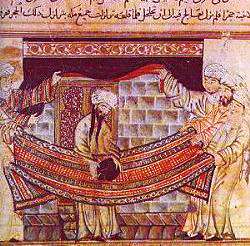 Given the general Middle Eastern mindset toward Israel, you would think that a country like Saudi Arabia would have a flawless pedigree dating back to prehistory.
Given the general Middle Eastern mindset toward Israel, you would think that a country like Saudi Arabia would have a flawless pedigree dating back to prehistory.Or so you would think. Actually, what we know today as Saudi Arabia is pretty much a 20th century political construct, albeit a 20th century constructed shaped by centuries of momentous cultural and spiritual trends. Prior to the arrival of Islam, Arabia was a trade center which rose and fell periodically according to the fashions in conquest at any given time. It began as a collection of tribal cultures that exported frankincense and myrrh to wise men and various other people who liked smelly stuff. The Arabs of the time believed in a pantheon of gods and celebrated a variety of fairly standard rituals in support of the pantheon (with sacrifices, icons, pilgrimages, and the like). In the sixth century A.D., however, a new wave arrived, a religion known as Islam, which would play a dominant role in determining the shape of the world for the next 1,500 years. Mecca had been a religious site for as long as anyone could remember. The temple at Mecca is known as Kaaba, which means cube, a name chosen for fairly obvious reasons related to the shape of the structure. The historical origins of Kaaba are unknown, but it is widely thought to pre-date the birth of Islam.
Islamic tradition is more specific when it comes to the temple: Kaaba was originally built by Adam, but the first temple was destroyed. The current structure at Kaaba is held to have been built by Abraham and Ishmael. When Muhammed founded Islam in the sixth century, Mecca became a central holy place, possibly due to the assimilation of pre-existing pagan traditions around the site. Sunni Islam (the faction representing about 90% of the world's Muslims) calls on all Muslims who are able to make the Haj, a pilgrimage to Mecca, at least once in their lives. As Islam spread across the world, the pilgrimage to Mecca upgraded the already valuable real estate of the Arabian peninsula to "priceless." Due to depressingly predictable human nature, this led to a series of wars for control of the region. Let's skip ahead to who won. The British joined with local Arabs to drive the Ottoman empire out of Mecca starting around 1914. In 1920, the area around Mecca was recognized as an independent kingdom known as Hijaz. Not far away, the region of Najd was led by a local potentate known as Ibn Saud. Western nations played Hijaz and the Saud clan against each other in a long string of political machinations, but in 1926, Ibn Saud gained the upper hand and took over both kingdoms.
Suddenly, Arabia wasn't just a point of interest for Muslims anymore. Through the 1950s, the Saudi government built its infrastructure around the oil industry, and the wealth of the region grew exponentially. The Saudi royal family spared no expense in building up their nation and their own personal holdings. One enterprising young construction magnate who played a critical role in making this expansion happen was Muhammad Awad bin Laden, who became one of the wealthiest men in the world as a result. Muhammad bin Laden crafted intimate ties with the royal family as their built an empire together; he became a hero of the state and a powerful dealer in influence. In 1955, he had his 17th son, Osama bin Laden, a development which didn't seem particularly important at the time. The Saud family were members of the Wahhabi sect, Sunni Muslims who followed strict fundamentalist practices. The Wahhabis believed that people essentially stopped having good ideas around the ninth century, and they rejected any change to Muslim teaching dated past that point. The Saud family instituted the Shari'ah in the kingdom, a system of strict Islamic religious law that serves as the nation's entire judicial system. Despite the Saud family's obscene wealth, the Wahhabis make a lot of noise about living austerely and avoiding vices such as drugs and alcohol. Content with accruing phenomenal amounts of wealth despite their religious commitment to not enjoying it, the Saudis became fast friends with the United States for entirely self-serving reasons on both sides. The friendship was tested, but not shattered, during the 1970s, when the Saudis and Iran decided to punish U.S. support for Israel in the Yom Kippur War by tripling the price of oil.
Then Hussein decided to bite the hands that had fed him, and things got complicated. Iraq's 1990 invasion of Kuwait clearly left Hussein in position to sweep right on into Saudi Arabia, much to the horror of the Saudis and their oil-peddling buddies in the Bush administration. In a fateful move, the Saudis invited the U.S. to move its military into their country, at first to prosecute the Gulf War, then as part of a continuing strategy to contain both Iran and Iraq. The decision to allow U.S. troops into the kingdom infuriated many wealthy and powerful Saudis, including Osama bin Laden. bin Laden had made a name for himself fighting the Soviet Union in Afghanistan, and when Iraq invaded Kuwait, he went to the Saudi royal family with an offer to deploy his mujahideen fighters in defense of the kingdom. When the royal family politely declined his assistance in favor of U.S. tanks, bin Laden threw a fit and eventually was sent into exile, where he continued to build his al Qaeda terrorist network, which made a primary tenet out of the demand that the U.S. remove all forces from the Holy Lands.
In a concession to the popularity, wealth and influence of these sheikhs and the bin Laden family itself, the Saudis continually played a game of misdirection concerning Osama's terrorist activities, even when they began to be directly aimed at the U.S. Afte the September 11 attacks on the World Trade Center and the Pentagon, the U.S. put heavy pressure on the Saudis to pitch in for the War on Terror. The Saudis made a show of support, but it was mostly just that — a show. For instance, they arrested Khalifa shortly after the attack, but subsequently released him. He now lives freely in the kingdom, despite the fact that he's wanted by the FBI and the CIA in relation to his terrorist activities in the U.S., the Philippines and elsewhere. When U.S. President George W Bush decided to expand the war on terror to include a second war Iraq with the objective of toppling Saddam Hussein's regime, the Saudis (and most of the rest of the Middle East) wanted nothing to do with it, and they refused to let the U.S. deploy troops in the kingdom for use in the conflict. Ironically, this disagreement resulted in a major victory for bin Laden, which was littled noted in the press at the time: The U.S. military completely vacated Saudi Arabia, which has long been one of the stated political goals of al Qaeda's terrorist activities.
In addition to the complex issues surrounding the U.S. presence in the Persian Gulf, the Iraq "war of liberation," waged with the specific intent of promulgating democracy in the Middle East, has raised serious concerns among many Arab states as to their own futures. The Saudi monarchy is by no means a "constitutional monarchy" with a figurehead at the top, like the U.K. It's an absolute monarchy, i.e., an absolute dictatorship with a hereditary leader that controls every aspect of government and life within in the kingdom, which claims (very seriously) its rule is divinely mandated. Once a new regime starts to take shape in Iraq, one can be certain the Saudis will be watching closely for that "domino effect" that George W. Bush discussed with great enthusiasm. If Saudi Arabia can produce an Osama bin Laden in good times and during an intimate alliance with the U.S. administration, just imagine what could happen in bad times and during a rift between the two nations. It boggles the mind. Especiallty when you consider that the Saudis provided a comfy home in exile for Uganda's former cannibal-in-chief Idi Amin Dada until the day he died. Things could get ugly indeed...
Timeline
|
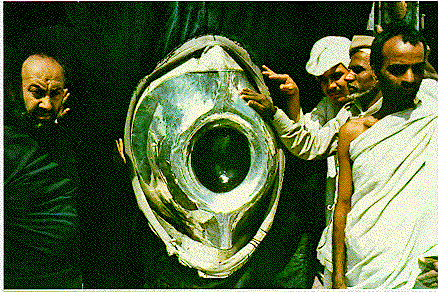 Inside Kaaba, the black stone of Mecca can be found. Thought by many to be a meteor fragment, the sacred stone is broken into three pieces and housed in as silver mounting. There are a number of conflicting legends about the stone. One of the most-repeated holds that the stone was given to Adam by Allah, and that it was originally light-colored but turned black because it absorbs the sins of those who touch it.
Inside Kaaba, the black stone of Mecca can be found. Thought by many to be a meteor fragment, the sacred stone is broken into three pieces and housed in as silver mounting. There are a number of conflicting legends about the stone. One of the most-repeated holds that the stone was given to Adam by Allah, and that it was originally light-colored but turned black because it absorbs the sins of those who touch it. 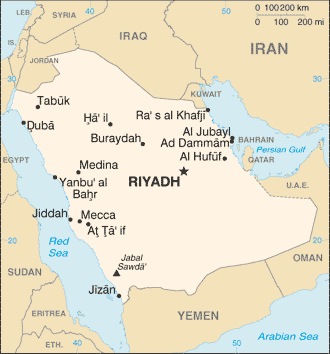 In 1932, the region was renamed Saudi Arabia. The next year, they were shootin' for some food, when up from the ground came a bubblin' crude. Oil, that is. Black gold.
In 1932, the region was renamed Saudi Arabia. The next year, they were shootin' for some food, when up from the ground came a bubblin' crude. Oil, that is. Black gold.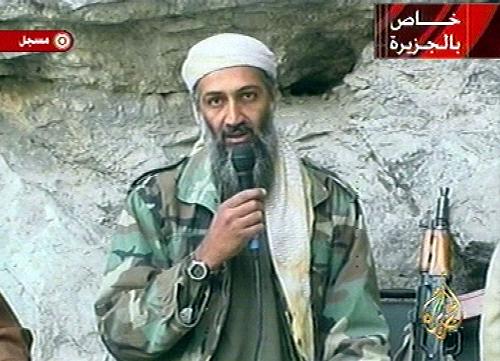 When Shia Muslims toppled the government in Iran in 1979, however, expediency patched up the dispute quickly. Shia Muslims and Wahhabis are pretty much fundementally opposed fundamentalists. The Saudis felt sufficiently threatened to make nice with the West once more, and the U.S. obviously had some serious problems with Iran at that point. The Saudis and the U.S. joined forces to bankroll
When Shia Muslims toppled the government in Iran in 1979, however, expediency patched up the dispute quickly. Shia Muslims and Wahhabis are pretty much fundementally opposed fundamentalists. The Saudis felt sufficiently threatened to make nice with the West once more, and the U.S. obviously had some serious problems with Iran at that point. The Saudis and the U.S. joined forces to bankroll 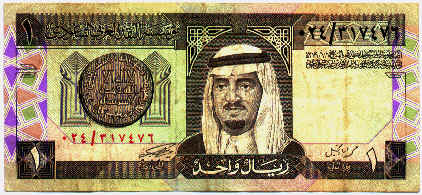 Wealthy Saudis had already long been sponsors of terrorism in the Middle East, particularly against Israeli targets, and the influential bin Laden had little trouble recruiting a number of very wealthy sponsors for his organization. Among these men were
Wealthy Saudis had already long been sponsors of terrorism in the Middle East, particularly against Israeli targets, and the influential bin Laden had little trouble recruiting a number of very wealthy sponsors for his organization. Among these men were 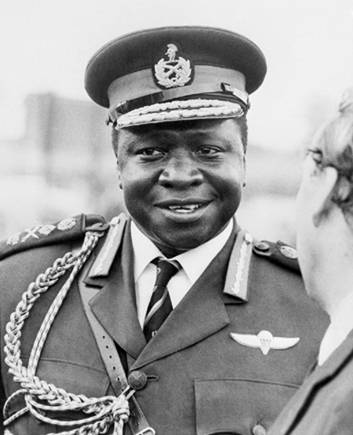 In the aftermath of the Iraq invasion of 2003, international observers are closely watching Saudi Arabia, as a measure of the depth and breadth of U.S. alienation in the Arab world.
In the aftermath of the Iraq invasion of 2003, international observers are closely watching Saudi Arabia, as a measure of the depth and breadth of U.S. alienation in the Arab world.